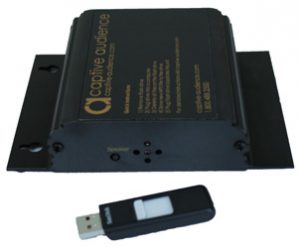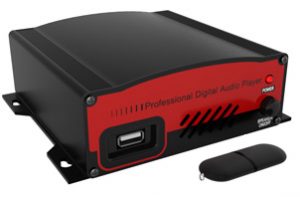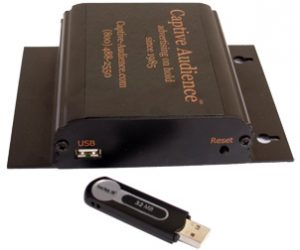
Q. Please give our readers an introduction to your business. Please include what your business is all about, in which city you are located and if you have offices in multiple locations/ cities.
A. Captive Audience is a marketing firm that specializes in electronic point-of-purchase systems. We primarily provide advertising on-hold for phone systems, but also digital signage, overhead music, voice production, video production and now complete VoIP phone systems (since clients have been asking for them).
Q. Kindly give us a brief description about yourself (it should include your brief educational or entrepreneurial background and list some of your major achievements).
A. I’m a UCLA graduate in psychology. I was a broadcaster with CBS affiliate when I founded Captive Audience in September of 1985. We’ve operated since doing production work — primarily Captive Audience advertising on-hold. The product was distributed by Sears in the late 80s. Today we have a number of large national clients currently used at thousands of locations around the country, as well as in the UK, Belgium, Venezuela and India.
Q. What inspired you to (start a new business venture) or (to make significant changes in an existing business)? How did the idea for your business come about?
A. I saw an opportunity to market through phone systems after telephone divestiture in 1984, allowing us to work directly with phone system owners. I opened my doors and prayed the phone would ring because I couldn’t sell. The next day the phone rang with a previous client. I syndicated her radio show for the next 15 years. We ended up on over 600 radio stations daily.
Q. What three pieces of advice would you give to budding entrepreneurs?
A. Be honest and keep your promises. Find out what the customer wants and give it to them. Never give up.
Q. What would you say are the top three skills needed to be a successful entrepreneur?
A. Spot opportunity. Honest assessment of what you can do. Watch your bottom line.
Q. How many hours do you work a day on average?
A. Not nearly as much as I used to. During my first three years in business, I never took a day off. Then I realized that by dropping my least profitable client who was also my biggest, I cut my hours by a third and made 50% more money the next year.
Q. To what do you most attribute your success?
A. “Too dumb to quit”. Don’t stop a foot from gold.
Q. How do you go about marketing your business? What has been your most successful form of marketing?
A. We market online through distributors and, most importantly, tons of referrals.
Q. Where did your organizations funding/capital come from and how did you go about getting it? How did you obtain investors for your venture?
A. I started with wedding money to buy some gear and tried to avoid any debt when possible. I’ve always just kept plowing profits back in to growth.

Q. What is the best way to achieve long-term success?
A. Take great care of your clients, and keep your eye on changing business climate.
Q. Where you see yourself and your business in 5 – 10 years?
A. In the same place… but with many more clients.
Q. Excluding yours, what company or business do you admire the most?
A. Toyota and Apple.
Q. How important have good employees been to your success?
A. Absolute key. I watch their back, so they watch mine.
Q. How long do you stick with an idea before giving up?
A. Probably too long, but somehow we make ideas pay out with patience.
Q. What motivates you?
A. I’ve wanted to do this for a living since I was 13 years old so it’s not really work.
Q. What are your ideals?
A. Live by the golden rule.
Q. How do you generate new ideas?
A. I read incessantly, and talk with my crew.
Q. How do you define success?
A. I always wanted to be like Rickey Dunlop’s dad, (Rickey was a childhood friend, his dad was an author). Great lifestyle. Now I live it.
Q. How do you build a successful customer base?
A. Come on…. one at a time.
Q. What is your favorite aspect of being an entrepreneur?
A. Plant a seed and watch it grow over time.
Q. What has been your most satisfying moment in business?
A. Dreaming then finally getting that dream client. Never gets old. Sears was probably the first huge step.
Q. What do you feel is the major difference between entrepreneurs and those who work for someone else?
A. Nobody wants to be responsible for everything. Taking responsibility allows me to work with folks that are much smarter than I am.
Q. What kind of culture exists in your organization? How did you establish this tone and why did you institute this particular type of culture?
A. We act like a family, watching out for each other. Everyone controls their area. We make sure that clients are taken care of.
Q. In one word, characterize your life as an entrepreneur.
A. Fulfilling.

Q. If you had the chance to start your career over again, what would you do differently?
A. I’d swing a bigger bat and reach higher.
Q. How has being an entrepreneur affected your family life?
A. It’s allowed a lifestyle that few are afforded. Tons of time with my wife and kids. The average dad spends three minutes a day with their kids, I spent all day every day with mine.
Q. What is your greatest fear, and how do you manage fear?
A. I fear that the business will fail, but I suit up and show up anyway. I usually take solo fear meetings at 3am in the morning, to get them out of the way before the day begins.
Q. How did you decide on the location for your business?
A. I worked at home for 12 years. Great way to watch the kids grow up.
Q. Do you believe there is some sort of pattern or formula to becoming a successful entrepreneur?
A. “Own your business, have what people want, multiply yourself”
— J Paul Getty
Q. If you could talk to one person from history, who would it be and why?
A. Abraham Lincoln because I grew up in Springfield, Illinois — his hometown.
Q. Who has been your greatest inspiration?
A. My dad.
Q. What book has inspired you the most? (OR what is your favorite book?)
A. Guerilla Marketing by J. Levinson. I had the pleasure to take his seminar. He is a great marketer.
Q. What are some of the biggest mistakes you’ve made?
A. Missed opportunities, too many to count.
Q. How can you prevent mistakes or do damage control?
A. We systemize everything and do analysis when something goes wrong to prevent
future errors.

Q. What are your hobbies? What do you do in your non-work time?
A. I’m an avid mountain biker and crummy wood worker.
Q. What makes you happy?
A. Looking for that perfect day. I come as close as I can each day.
Q. What sacrifices have you had to make to be a successful entrepreneur?
A. Several years of low pay with only a sliver of a dream to hold on to.
Q. If you were conducting this interview, what question would you ask?
A. Are we done yet?
